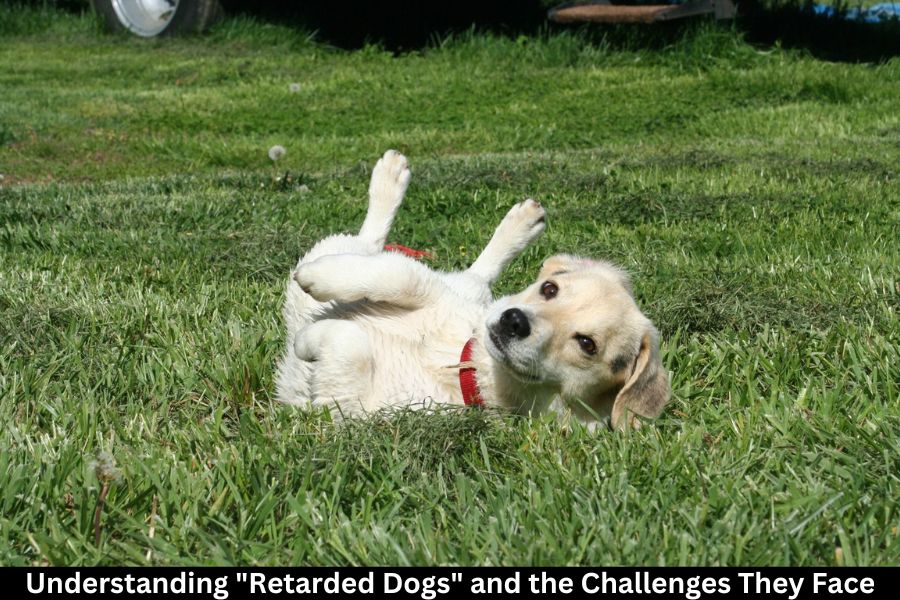When we communicate about dogs, we frequently become conscious of their playful nature, loyalty, and intelligence. However, some dogs face demanding situations that aren’t constantly seen at the beginning. The term “retarded canine” has been used, albeit insensitively, to explain puppies with developmental delays. It’s vital to method this topic with expertise and empathy, spotting the precise needs and capacity of these puppies.
Defining “Retarded Dog”
The period “retarded dog” is previous and offensive. It’s critical to apply more accurate and respectful language, such as “developmentally not on time canine” or “canine with special needs.” Developmental delays in dogs can happen in diverse methods, affecting their studying, behavior, and ordinary functioning. These delays may be due to genetic elements, fitness conditions, or environmental influences.
Common Misconceptions
There are many myths surrounding dogs with developmental delays. One commonplace false impression is that those dogs cannot research or live gratifying lives. This is far from the truth. With the right aid and education, developmentally not on time puppies can lead satisfied, enriching lives. Another delusion is that those dogs are continually competitive or complicated. Their behavior is often a result of misunderstanding or unmet desires.
Causes of Developmental Delays in Dogs
Several elements can contribute to developmental delays in puppies:
Genetic Factors
Some breeds are more predisposed to genetic conditions which could motivate developmental troubles. For example, certain neurological disorders can be inherited.
Environmental Influences
A dog’s early surroundings play a substantial position in their development. Lack of socialization, trauma, or forgetting can result in delays in emotional and behavioral growth.
Health Conditions
Health issues which include congenital defects, infections, or neurological problems can impact a dog’s development. Early detection and treatment are critical for managing these situations.
Recognizing Developmental Delays
Identifying developmental delays early on can make a substantial distinction in a dog’s nice of existence. Here are some symptoms to look out for:
Behavioral Signs
- Difficulty in learning primary instructions
- Unusual fearfulness or aggression
- Hyperactivity or loss of consciousness
Physical Signs
- Coordination troubles
- Stunted growth or uncommon physical functions
- Persistent fitness troubles
Diagnostic Process
Diagnosing developmental delays entails a complete approach:
Veterinary Assessment
A thorough exam by way of a veterinarian can help identify underlying health problems that may be contributing to the delays.
Behavioral Evaluations
Professional running shoes or animal behaviorists can check a canine’s behavior to pinpoint unique challenges and suggest appropriate interventions.
Importance of Early Diagnosis
Early diagnosis permits for well-timed intervention, that may substantially enhance a canine’s development and pleasant life.
Living with a Developmentally Delayed Dog
Living with a developmentally behind-schedule canine requires persistence and adaptability:
Adjusting Expectations
Understanding that your canine may additionally research and increase at a unique pace can assist manage frustrations and set sensible goals.
Creating a Supportive Environment
Providing stable, loving surroundings is crucial. Consistent workouts and a safe space can help your dog experience steady and support.
Routine and Consistency
Dogs thrive on recurring. Consistent feeding times, exercising, and schooling periods can assist your dog in understanding expectancies and sense extra comfort.
Training and Socialization
Training a developmentally delayed dog can be hard however rewarding:
Tailoring Training Methods
Using advantageous reinforcement and persistence is prime. Break obligations into smaller steps and rejoice in small achievements.
Importance of Patience and Positive Reinforcement
Patience is essential. Positive reinforcement, such as treats and praise, encourages desired behaviors and strengthens the bond between you and your canine.
Socialization Strategies
Gradual publicity to new environments and social settings can help your dog end up more snug and adaptable.
Health and Wellness
Maintaining your dog’s health is important:
Regular Veterinary Care
Frequently take a look United States of America and make sure any fitness problems are directly addressed and controlled.
Nutrition and Exercise
A balanced food plan and ordinary exercise guide standard fitness and development.
Mental Stimulation
Engaging your canine in mental activities, which include puzzle toys and interactive video games, maintains their mind sharp and reduces anxiety.
Emotional Support for Owners
Caring for a developmentally delayed dog may be emotionally taxing:
Coping Strategies
Developing coping strategies, along with mindfulness and looking for a guide, will let you manage stress and maintain a fantastic outlook.
Support Groups and Resources
Connecting with other puppy owners going through comparable challenges presents a sense of network and shared expertise.
Importance of Self-Care
Taking care of your well-being is critical. Ensure you are taking time for yourself to recharge and keep away from burnout.
Success Stories
Hearing about others’ stories can be inspiring:
Real-Life Examples
Stories of developmentally not-on-time puppies thriving no matter their challenges can offer desire and motivation.
Overcoming Challenges
Understanding how others have navigated comparable obstacles can offer practical suggestions and encouragement.
Celebrating Small Victories
Recognizing and celebrating your dog’s progress, irrespective of how small, fosters an advantageous environment and strengthens your bond.
Advocacy and Awareness
Promoting information and empathy is crucial:
Promoting Understanding
Educating others approximately developmental delays in puppies enables lessening stigma and promotes compassion.
Combating Stigma
Challenging terrible perceptions and misinformation fosters an extra inclusive and supportive community.
Encouraging Responsible Pet Ownership
Advocating for accountable puppy possession ensures that every puppy gets hold of the care and interest they deserve.
Resources for Help
Accessing the proper resources can make a good sized distinction:
Organizations and Support Networks
Numerous organizations offer guides and sources for owners of developmentally not-on-time puppies.
Educational Materials
Books, articles, and online courses offer precious information and steering.
Professional Help
Seeking help from veterinarians, running shoes, and behaviorists ensures your dog gets quality viable care.
Conclusion
Understanding and assisting developmentally not on time dogs require endurance, compassion, and a willingness to examine. These puppies, like all others, can lead happy and pleasant lives with the proper care and interest. By selling focus and advocating for accountable puppy possession, we will create a greater inclusive and empathetic global for all puppies.
FAQs
Can developmental delays be dealt with in puppies?
While developmental delays may not be “cured,” they may be controlled efficiently with the right support, schooling, and hospital treatment.
How can I inform if my dog has a developmental put-off?
Look for signs and symptoms inclusive of difficulty learning commands, unusual conduct, and bodily abnormalities. Consult a veterinarian for a radical assessment.
What are the nice schooling methods for a developmentally delayed dog?
Use effective reinforcement, destroy responsibilities into smaller steps, and be an affected person. Tailor education techniques on your canine’s precise wishes and pace.
Are there precise breeds greater susceptible to developmental delays?
Certain breeds may be extra prone to genetic conditions that could cause developmental delays. However, any canine can be affected.
How can I support my developmentally behind-schedule dog emotionally?
Provide solid, loving surroundings, preserve consistent workouts, and offer plenty of intellectual stimulation and socialization opportunities.


